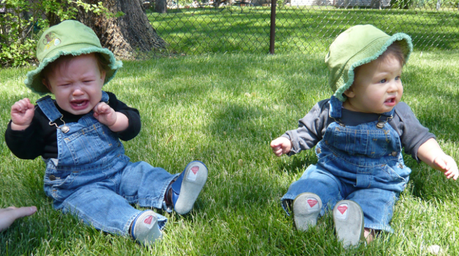Our first child opened his eyes on this world for the first time at the beginning of October in Northern California. I was on my feet minutes after his delivery, and out walking with him in the sunshine two days after that. Although I had been ambivalent on learning of my pregnancy – we’d been married barely a year and a half; I’d just turned 23, and we hadn’t planned this – every cliché in the book applied: my son was astonishingly beautiful and I loved him fiercely. My grandmothers’ genes made it such that I was immediately back in my regular jeans, and we seemed to be off to a great start.
That is, until our son reached the ripe age of two weeks and decided that he wanted to bail on the whole ‘being a baby’ thing. I have since encountered other babies and children who matched his distinct set of characteristics. Rather than lulling him to sleep, the baby swing wound him up, as did going for car rides. Even rocking and nursing were more stimulating than soothing for him. He was too awake, too alert; too full of desires he was far from being able to communicate to us, or, better, to fulfill on his own. The very day he was able to grasp a butterfly rattle and shake it in front of his face – all by himself! – he fell asleep right there on the floor, contented and happy.
One of the most oft-repeated bits of unsolicited advice proffered to new mothers is “sleep when the baby sleeps,” which is all right when it’s your first baby and you’re not suffering from an anxiety disorder. I never could sleep when the baby slept, because it took such monumental effort to get him to sleep that every little squeak and murmur in our old house or outside it jolted me awake, worried that I’d have to start the whole going to sleep process again: the diaper change, the super-tight swaddling, the strategic pacifier insertion method, the pediatrician-approved wedged-in side sleeping position, and the little womb-sounds device we affectionately called “the swooshy.” After three months of this, I was a sniveling wreck of mature theological insights such as
“They say children are a blessing from the Lord but I think they’re wrong!”
People would ask me how many children we’d like to have in all and I’d just stare at them. Our son was two and a half when his brother entered the scene, and although little Graeme was a textbook ‘easy’ baby, in the weeks and months after his birth I began a slippery slide into postpartum depression. I couldn’t explain what was wrong; why I was so anxious, sad, and scared. And that, too, scared me. I don’t think I even had the energy for immature squabbles with God about whether or not children were really the blessings the Bible made them out to be. I just felt closed off from God, and almost everyone else, too.

“First Time in the Grass,” by SurlyGirl. Photo courtesy SurlyGirl via Flickr Creative Commons.
{Excerpted from my review of Kimberlee Conway Ireton’s memoir of having two kids — and then twins! — and a bit of a faith crisis in the process. Read it all at Englewood Review of Books — here.}
